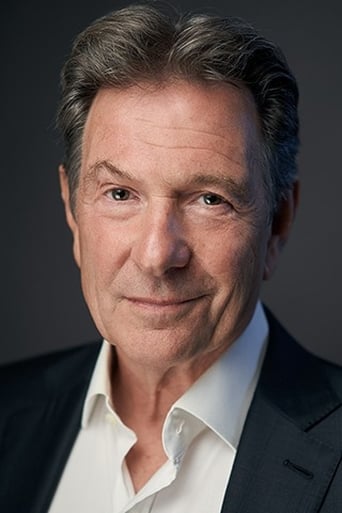Hellen
I like the storyline of this show,it attract me so much
VividSimon
Simply Perfect
Salubfoto
It's an amazing and heartbreaking story.
Jenna Walter
The film may be flawed, but its message is not.
Judith McKenzie
The Theory of Everything is a fine film, as Hollywood films go, but this BBC Production "Hawking," made several years earlier, has me wondering why Hollywood bothered, as none could match the performances in nor the spirit of this film. A lovely portrayal (as usual) by Cumberbatch as Hawking, and Firth makes the perfect (sympathetic and pitiable) antagonist. This film, in contrast to the recent Hollywood knock-off, focuses on the brilliance and courage of an amazing man with an amazing mind. The film begins in the 1960s, prior to the onset of Hawking's motor neuron disease, and focuses on his struggle to maintain his work while fighting the progression of motor dysfunction. As a (retired) member of the academy, I can attest to the realism of the struggles he faces in gaining support for his work, and the energy required to do so, brilliantly portrayed in this film. I was privileged to see Professor Hawking speak once in Seattle, and one knew that one was in the presence of a once-in-a-generation mind. This film, and Cumberbatch's performance, authentically conveys that sense. Highly recommended.
dy158
It is 1978, and two men are waiting to collect their Noble Prize in Physics in Sweden. Arno Penzias (Michael Brandon) and Robert Wilson (Tom Hodgkins) were preparing to give a television interview before they are due to collect their prize. The interview with the journalist (Christian Rubeck) would be about how a hissing sound they discovered inside a huge satellite receiver won them the Nobel Prize.It would intercut with a seemingly unrelated event from 15 years before in 1963 in England where Stephen Hawking (Benedict Cumberbatch) was celebrating his 21st birthday. He was actually watching Fred Hoyle (Peter Firth) talking about his steady state theory on television, before he went into another room where his birthday party was held in his house after the programme ended. He was delighted to see the girl he had met from another party Jane Wilde (Lisa Dillon) in the room. They would later go out to the back garden and discuss about the sky while lying down. But when Stephen tried to get up later on, he could not do so. Jane had initially thought Stephen was joking with her before she became worried and went to get help.Stephen would come to find himself being put through a series of tests at the hospital's operating theatre. The following day, as the nurse was moving his pillow causing him to lean forward, Stephen noticed a young boy across him where he would learn the boy was 12 years of age and had leukemia. When Stephen woke up the next day, the boy was no longer there as he learned that the boy had died the night before. Stephen would run into his doctor who tells him he has Motor Neuron Disease, which would cause anxiety all around and even in the family for his parents Frank (Adam Godley) and Isobel (Phoebe Nicholls).Later in the same year, Stephen would be studying at Trinity Hall at Cambridge where he would begin his first year as a doctoral student where he would be tutored under Dennis Sciama (John Sessions). It was also when he would come to publicly challenge Hoyle on his steady state theory with his student Jayant Narlikar (Rohan Siva) which would lead to what he come to produce in his dissertation as partly inspired by what another professor Roger Penrose (Tom Ward) had taught.Those who has a deep interest in science will take an interest in this, especially for what the real Stephen Hawking would come to be known. The average audience will not be able to understand much of the concepts as explained in the television movie as it will look abstract to the. Thus for the average audience, they may not be able to understand why there are times the scenes of showing Hawking during his Cambridge days intercuts with the television interview Arno Penzias and Robert Wilson was doing, even if it would be explained towards the ending on the screen on what the two men in real life would receive the Nobel Prize in Physics for.But for everyone else, it is a reminder of the real Stephen Hawking's early path to his scientific greatness as he would come to challenge Fred Hoyle on what he had proposed, or as Hawking said in the television movie, "We are very very small. But we are profoundly capable of very very big things."
angelofvic
For those perhaps shy of this film thinking it may be grim or depressing -- it's quite the opposite. It's about Hawking in his early years -- getting his doctorate at Cambridge in the early 1960s, long before incapacitation set in.This is Hawking in his green and wide-eyed youth, when he was just starting to wrap his mind around the amazing theories that changed theoretical physics and astrophysics. The film is joyful and uplifting and engaging and intriguing. It's not esoteric, and can certainly be followed by non-physicists such as myself.And in case you've been under a rock lately, Benedict Cumberbatch is the finest young actor in the UK, and gives an unmissable performance, as usual.Highly recommended for everyone!
F Gwynplaine MacIntyre
'Hawking', which I saw recently on BBC2, is a fictionalised telefilm biography of physicist Stephen Hawking ... known to Homer Simpson as 'that wheelchair guy'. (Hawking is also the only person ever to make a guest appearance *as himself* in an episode of 'Star Trek: The Next Generation'.) Some modern-day public figures are so well-known -- in vocal patterns and physical appearance -- that any actor's attempt to portray them on screen must be to some extent a physical impersonation. A depiction of Hawking presents unusual opportunities and challenges. Firstly, audiences have no idea what Hawking's speaking voice sounded like, as he did not become a public figure until the progressive degenerative disease which afflicts him (amyotrophic lateral sclerosis, or ALS) had worsened to the point that he now 'speaks' with the aid of an electronically-generated voice that makes him sound like a Dalek. In the early scenes of 'Hawking', before Hawking acquires ALS, actor Benedict Cumberbatch (great name!) speaks in a cultured voice that is certainly appropriate to the character he plays on screen, if not the actual Hawking.More problematic is the physical portrayal, as we're aware that an 'able' actor is portraying a disabled person: if Cumberbatch's rendition of Hawking's symptoms is accurate, inevitably some audience members will accuse him of overacting. This is a no-win situation, which would have daunted any non-disabled actor in such a role.Cumberbatch is appealing and charismatic (more so than the real Hawking) in the early sequences, leading up to when Hawking first experiences tremors at age 21. There's an awkward scene in a jazz club, that could have degenerated into self-parody. We see Hawking, physically challenged but not yet incapacitated, watching enviously while others dance. Awkwardly, he rises and attempts to join in. (By all accounts, Hawking was socially uncoordinated long before he was physically so.) Cumberbatch gives as much dignity as possible to a portrayal which we recognise as that of a graceful actor depicting a man who has both social and neurological disabilities.The portrayals of some of the other real-life figures are not very well-thought. I knew Sir Fred Hoyle, and the actor who portrays him here is neither especially accurate nor especially credible in his portrayal ... except for the scene re-enacting the famous incident when Hawking denounced Hoyle's latest theory in the auditorium of the Royal Society. Roger Penrose, the developer of tile theory, is played here as an absent-minded boffin who witters away at the public bar without remembering that he'd meant to order a pint.The most ludicrous scene (a fictitious incident?) occurs when Hawking is in a railway compartment with a woman who can talk the hind leg off a donkey, prompting Hawking to suddenly imagine Time reversing itself. This scene appears to be inspired by a sequence in 'A Beautiful Mind', but that film depicted scientific inspiration much more cleverly than is done here.Cumberbatch is quite good in the early scenes, yet he gets even better in the later scenes as Hawking's ALS takes its toll on his body. Inevitably, Cumberbatch's role gravitates into Lon Chaney territory, yet his portrayal is so deft that it never quite tips over into histrionics. The period detail and production design are impeccable throughout.SLIGHT SPOILER NOW. There is an awkward framing device, reminiscent of several Tom Stoppard plays or Michael Frayn's 'Copenhagen', yet less effective than either. We see two Nobel laureates giving a TV interview, discussing a noise they've discovered, which turns out to be the background microwave radiation that fills the universe ... the leftover sound of the Big Bang. (Fred Hoyle invented that term, but intended it derisively: he rejected the Big Bang theory which is now widely accepted.)I'll rate 'Hawking' 8 out of 10, as a flawed but excellent attempt to depict a difficult biographical subject who is involved in a field that audiences don't readily comprehend. ALS, the disease that crippled Stephen Hawking, is known in America as Lou Gehrig's disease, in honour(?) of the baseball player whose brilliant career and promising life were ended by it. Lou Gehrig's story was told brilliantly in 'Pride of the Yankees', but that great film remained very shadowy and nebulous about the terrible disease at the centre of its story. 'Hawking' does not pull such punches, and I recommend this excellent bio-pic.








